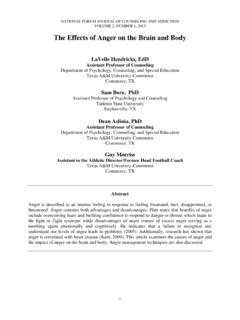Transcription of THE EFFECT OF ANGER ON FAMILIES - Lakefront Wellness …
1 THE EFFECT OF ANGER ON FAMILIES Family ties are one of the strongest contributors to individual character development. Many of us spend years trying to understand, erase, or copy the influence of our family unit. When ANGER is part of a family s tradition, it spreads itself much like a virus to future generations. The wider the spread, the more difficult the ANGER is to contain. The EFFECT of ANGER in FAMILIES is usually apparent in the way that members relate with one another. Our earliest experiences communicating and relating to others occurs within the family. Patterns of ANGER in relationships are then taken and recreated in later relationships outside the family. Thankfully, a committed, well-designed treatment plan can repair the damage of having been raised in an angry family system.
2 ANGER in Relationships ANGER is one of the most common negative patterns in relationships. Couples sometimes report that it is their ANGER that makes the relationship feel alive. ANGER takes root in insecure relationships where open communication is absent and the emotion of love is buried beneath years of resentment. There is typically hopelessness in the present and doubt about the future in these relationships. The good news is that individuals committed to improving their relationships through the hard work of therapy are generally rewarded with a renewed sense of hope. Here are some tips on how to limit ANGER producing interactions in your relationships: 1. When you have ANGER toward another person, start with an internal check of your own emotional state.
3 Ask yourself why you feel the way you do. 2. Before feeling attacked or hurt, make an attempt to give others the benefit of the doubt, especially if you have nothing to lose by doing so. 3. Ask yourself if you have legitimate assumptions about the intentions of others. 4. Keep the lines of communication open. When you feel resentment building, see if you can journal your feelings and then share your thoughts with a loved one. 5. Explore your participation in relationships that repeatedly bring out the worst in you. 6. Always consider individual or family therapy in instances where your ANGER feels out of control and/or mysterious. How Do I Know If My Family or Loved One Has an ANGER Problem? Angry individuals are, in most instances, very aware of their problems in controlling ANGER .
4 Unfortunately, too many come to accept their ANGER as an unchangeable part of who they are and feel hopeless to change. If you feel that you or a loved one may have an ANGER disorder, look for several of the following symptoms happening in your life on a regular basis: Becoming more angry than is appropriate in regard to mild frustration or irritation. Having feelings of guilt or regret over something that you have said or done in a fit of ANGER . Repeated social conflict as a result of ANGER outbursts (law suits, fights, property damage, school suspensions, etc.) Family and/or friends approach you with the concern that you need help managing your ANGER . Having chronic physical symptoms such as high blood pressure, gastrointestinal, difficulties, or anxiety.
5 Where to Get Help for My ANGER Fortunately, the mental health profession has been responsive to individuals seeking treatment for help with ANGER . Referrals to treatment programs and services are often available and mandated for those individuals suffering moderate to severe social conflict. Many chronically angry individuals feel shame and guilt about their ANGER . There may be times when a friend or loved one may need to request help or plan an intervention for the angry individual. In such instances, it is critical to take advantage of mental health professionals with a background in ANGER management training. What Kind of Help Will I Get for My ANGER ? An effective ANGER management plan can include individual or family therapies, which are some of the more common ways people attempt to deal with chronic ANGER .
6 Individual Therapy Individual therapy, which explores the root of angry feelings and behavior, is traditionally a safer, more secure option to working with the entire angry family at once. Treatment with individuals helps facilitate a thorough focus on the most important emotions beneath the individual s ANGER . Family Therapy Family therapy is a powerful way of repairing the damaging EFFECT of long-term ANGER interactions. Over time, chronic ANGER drives a wedge between family members, resulting in the members becoming disconnected from one another, or overly involved with one another in an unhealthy manner. Therapy would consider each member s role in the ANGER interactions, versus assuming any single member is responsible for the family s ANGER . How Marriage and Family Therapy Helps Control ANGER More often than not, chronic ANGER has a lengthy, definable history.
7 Marriage and family therapists are trained experts in identifying ANGER patterns that pass from one generation to the next. Identifying these patterns helps to explore individuals learned perceptions about the appropriateness of ANGER expression and suppression. Encouraging a parent to share how emotions were expressed in his or her immediate family allows other family members to understand the family s inherited concepts about ANGER . Books ANGER -Free: Ten Basic Steps to Managing Your ANGER . By D. Gentry, William Morrow & Company, Inc. (1999). Help for the Angry Family (series). By Ron Potter-Efron (2001). The author, a therapist at First Things First Counseling Center, Eau Claire,WI, outlines the multiple ways that individuals and/or therapists can work to purge ANGER from the family.
8 The series includes: Help for the Parent of Angry Young Children (0-5) Help for the Parents of Angry Children (6-12) Help for the Parents of the Angry Adolescent Help for the Angry Couple 2006 by the AAMFT. written by Joseph Worth, PhD. Item #1093








